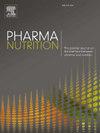牛皮癣治疗的进展:将营养补充剂与肠道-大脑-皮肤的联系结合起来
IF 2.4
Q3 NUTRITION & DIETETICS
引用次数: 0
摘要
背景银屑病是一种慢性炎症性皮肤病,影响着全球众多人群,由于其多方面的特点,给临床治疗带来了巨大挑战。最近的研究显示了肠道、大脑和皮肤之间的关系,揭示了新型治疗方法的潜力。方法本综述收录了 1991 年至 2024 年发表的论文,探讨了银屑病治疗的各种进展。我们还探讨了封装具有抗银屑病活性的天然生物活性分子的各种技术。我们使用 Scopus、Web of Science、Clinical Trials 和 Google Scholar 等多个数据库对已发表的文章进行了检索。银屑病的发病机制与肠道微生物失衡有关,即肠道菌群失调。益生菌、益生元和其他饮食干预措施有助于恢复微生物平衡,改善银屑病症状。此外,肠道微生物群还能调节神经递质和神经肽,影响肠道、大脑和皮肤之间的交流。压力是牛皮癣加重的公认诱因,会破坏肠道-大脑-皮肤轴。欧米伽-3 脂肪酸、多酚、益生菌补充剂、草药补充剂等营养补充剂可以减轻炎症,增强皮肤健康。缺乏维生素 D 等营养素可能会导致牛皮癣的发生。针对炎症途径、平衡肠道微生物群和解决营养缺乏问题可以改善银屑病的治疗效果。要证明天然生物活性物质的抗银屑病活性和调节肠道-大脑-皮肤轴的能力,还需要使用封装的天然生物活性物质进行大规模临床试验。本文章由计算机程序翻译,如有差异,请以英文原文为准。
Advancements in psoriasis management: Integrating nutrient supplement with gut-brain-skin connection
Background
Psoriasis is a chronic inflammatory skin disease that affects a large population globally and poses a significant challenge in clinical care due to its multifaceted characteristics. Recent studies show the relationship between the gut, brain, and skin, unveiling the potential for novel therapeutic approaches.
Methods
This review includes papers published from 1991 to 2024 exploring various advancements in psoriasis management. We also explored various techniques to encapsulate natural bioactive molecules with anti-psoriatic activity. The published articles were searched using various databases, including Scopus, Web of Science, Clinical Trials, and Google Scholar.
Results
The gut microbiome contains numerous microorganisms that influence immune regulation and inflammation. The pathogenesis of psoriasis has implicated an imbalance in gut microbes, known as gut dysbiosis. Probiotics, prebiotics, and other dietary interventions can help restore microbial balance and improve psoriasis symptoms. Furthermore, the gut microbiota can modulate neurotransmitters and neuropeptides, impacting communication between the gut, brain, and skin. Stress, a well-established trigger for psoriasis exacerbations, disrupts the gut-brain-skin axis. Nutrient supplements like omega-3 fatty acids, polyphenols, probiotic supplements, herbal supplements, etc. can reduce inflammation and enhance skin health. Deficiency in nutrients like vitamin D may contribute to psoriasis development. Targeting inflammatory pathways, balancing gut microbiomes, and addressing nutritional deficiencies can improve psoriasis treatment outcomes.
Conclusion
Natural bioactives have demonstrated antipsoriatic efficacy in several preclinical and clinical studies done in more recent years. Large-scale clinical trials using encapsulated natural bioactives are still needed to demonstrate their antipsoriatic activity and ability to regulate the gut-brain-skin axis.
求助全文
通过发布文献求助,成功后即可免费获取论文全文。
去求助
来源期刊

PharmaNutrition
Agricultural and Biological Sciences-Food Science
CiteScore
5.70
自引率
3.10%
发文量
33
审稿时长
12 days
 求助内容:
求助内容: 应助结果提醒方式:
应助结果提醒方式:


